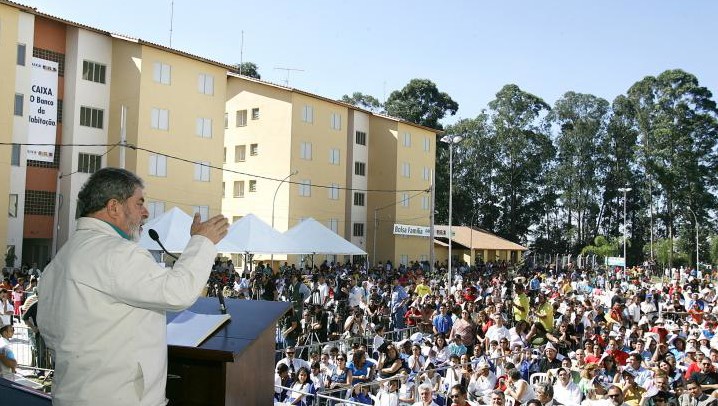The politics of welfare, here in the United States and abroad, are fraught with tension, and poverty reduction programs have long been a favorite straw-man of the American right. Who can forget the pejorative, ever-pervasive “Welfare Queen” myth so passionately pushed by President Reagan in 1976? How about the similarly pejorative “47 percent” comment from the esteemed ex-governor of Massachusetts on the campaign trail last year? The debate over welfare and assistance for the poor continues today to play into a broader, ideological one that concerns the merits of “big” government.
Campaigning in 1991, Bill Clinton promised to “end welfare as we know it.” That “as we know it” no doubt implied “unconditionality,” and indeed the passage of the Parental Responsibility and Work Opportunity Act three years later signaled a turning-point in federal cash assistance programs. Today, federal programs like the Earned Income Tax Credit (EITC) and Temporary Assistance for Needy Families (TANF) represent a pseudo-conditional different approach to welfare, yet one framed dangerously around derisive conceptions of the “deserving” and “undeserving” poor.
Many determine the success of government programs in terms of efficiency and opportunity cost. But when it comes to welfare, the first and primary question must always be: Do our government programs help to alleviate the suffering of the poor, and allow each and every American to live, paraphrasing Franklin Delano Roosevelt, free from want? Essentially, we must ask: Does welfare work? It did indeed seem so, at least during the Clinton administration. Poverty rates fell from 13.5 percent in 1990 to 11.30 percent in 2000. Yet during the last twelve years, that number has increased relatively steadily to 15 percent. In 2012, poverty levels in the United States were at their highest in twenty years. How much of that was due to consistent failures in government policy, and how much was due to the sharp spike in unemployment after the 2008 crisis? It’s tough to say. A non-committal but nonetheless reasonable answer might be that they are both equally responsible.
America has hardly been the only nation to experiment with conditional welfare reform. One of the ways in which a distinct kind of globalized social democracy took root in Latin America in the early 2000s, under the helm of Lula in Brazil and Vicente Fox (though a center-right politician), was conditional cash transfer (CCT) programs. Bolsa Familia in Brazil and Oportunidades in Mexico both represented, like Clinton’s welfare reform, a new approach to combating poverty. In these nations, conditionality implies a host of responsibilities; recipients must ensure their children attend school and receive vaccinations. During Lula’s first term, poverty fell 27.7 percent; in Mexico, poverty rates have fallen consistently since the implementation of Oportunidades and Progresa, the program’s predecessor. (see page 8). Unlike in America, a consensus has formed that Brazilian and Mexico welfare reform has, essentially, been working.
In 2007, the CCT programs that began in Brazil and Mexico took root in New York, where Mayor Bloomberg announced Opportunity NYC. The welfare program was novel in its method, at least here in the U.S., though it was hardly a public project. Its $40 million price tag was financed entirely through private contributions from organizations like the Rockefeller Foundation, the Open Society Foundation, and Bloomberg’s own foundation. As the New York Times wrote of the program in 2010, “The three-year-old pilot project, the first of its kind in the country, gave parents payments for things like going to the dentist ($100) or holding down a full-time job ($150 per month). Children were rewarded for attending school regularly ($25 to $50 per month) or passing a high school Regents exam ($600).”
By 2010, Bloomberg’s program was gone, deemed not necessarily a failure, but certainly not a success. Conditional cash transfer programs of the sort found in Brazil, Mexico, or New York strive for two goals. In the short-term, they are designed to lift the poorest members of society out of poverty. In the long-term, they are structured to develop human capital by increasing the quantity of education and health care services the poor receive. Opportunity NYC resulted in lower poverty levels among the recipients–but education and health levels didn’t alter by any noteworthy margin, with especially little change at the elementary and middle school levels for education.
Mr. Bloomberg, who is set to step down January 1st, has often received (at times often unfair) criticism for appearing unfeeling to the needs of the poor. He should be applauded for Opportunity NYC, however it ended. The answer to the question of why a CCT program might work in Brazil or Mexico but not in New York, or indeed at the federal level, is one that is perhaps found in the question itself. No two places are the same, and what works in one nation has every opportunity to fail in another. Perhaps Latin America’s acceptance of the state as a fundamental tool for positive change, or a lack of negative stigma surrounding welfare in the region, has resulted in the widespread approval of conditional cash transfers. It’s certainly difficult to imagine a Brazilian presidential nominee referring to welfare recipients as “entitled,” as Mitt Romney did. Nonetheless, the success of CCT programs in Latin America cannot be ignored, especially not by an America that now more than ever desperately needs to look out for their most marginalized.
